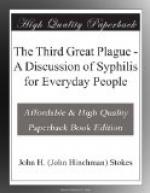+Syphilis, a Problem of Public Health Rather than of Morals.+—Nothing that can be said about syphilis need make us forget the importance of moral issues. The fact which so persistently distorts our point of view, that it is so largely associated with our sexual life, is probably a mere incident, biologically speaking, due in no small part to the almost absurdly simple circumstance that the germ of the disease cannot grow in the presence of air, and must therefore find refuge, in most cases, in the cavities and inlets from the surface of the body. History affords little support to the lingering belief that if syphilis is done away with, licentiousness will overrun the world. Long before syphilis appeared in Europe there was sexual immorality. In the five centuries in which it has had free play over the civilized world, the most optimistic cannot successfully maintain that it has materially bettered conditions or acted as a check on loose morals, though its relation to sexual intercourse has been known. As a morals policeman, syphilis can be obliterated without material loss to the cause of sexual self-restraint, and with nothing but gain to the human race.
It is easier to accept this point of view, that the stamping out of syphilis will not affect our ability to grapple with moral problems, and that there is nothing to be gained by refusing to do what can so easily be done, when we appreciate the immense amount of innocent suffering for which the disease is responsible. It must appeal to many as a bigoted and narrow virtue, little better than vice itself, which can derive any consolation in the thought that the sins of the fathers are being visited upon the children, as it watches a half-blind, groping child feel its way along a wall with one hand while it shields its face from the sunlight with the other. There are better ways of paying the wages of sin than this. Best of all, we can attack a sin at its source instead of at its fulfilment. How much better to have kept the mother free from syphilis by giving the father the benefit of our knowledge. The child who reaped his sowing gained nothing morally, and lost its physical heritage. Its mother lost her health and perhaps her self-respect. Neither one contributes anything through syphilis to the uplifting of the race. They are so much dead loss. To teach us to avoid such losses is the legitimate field of preventive medicine.




